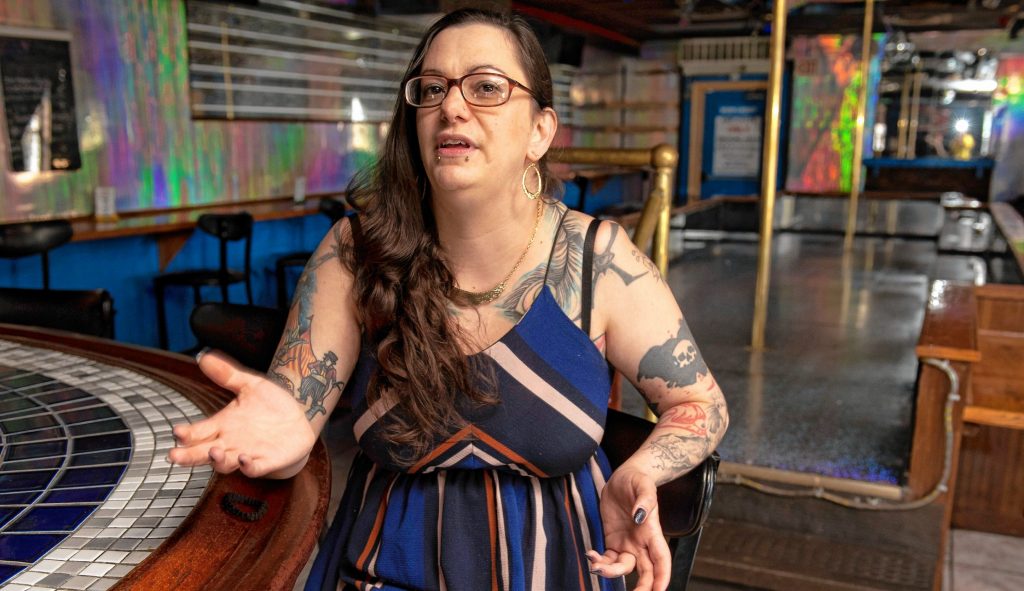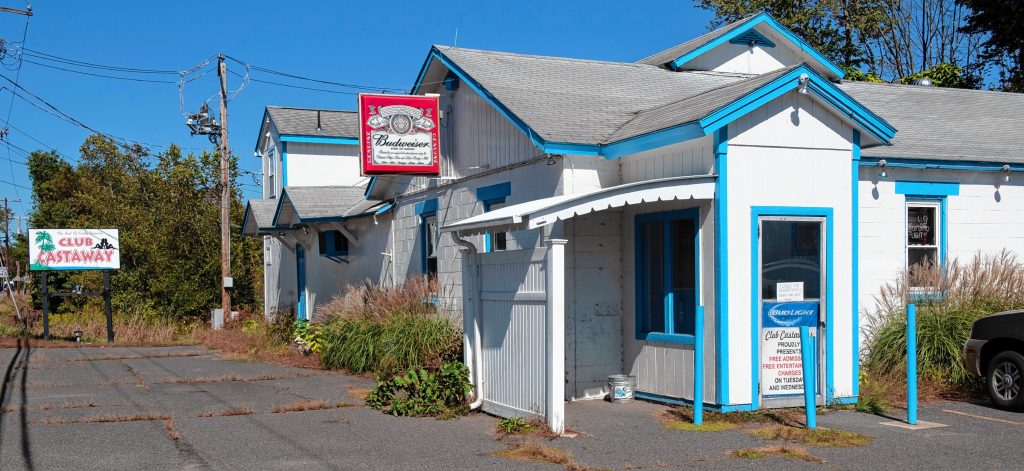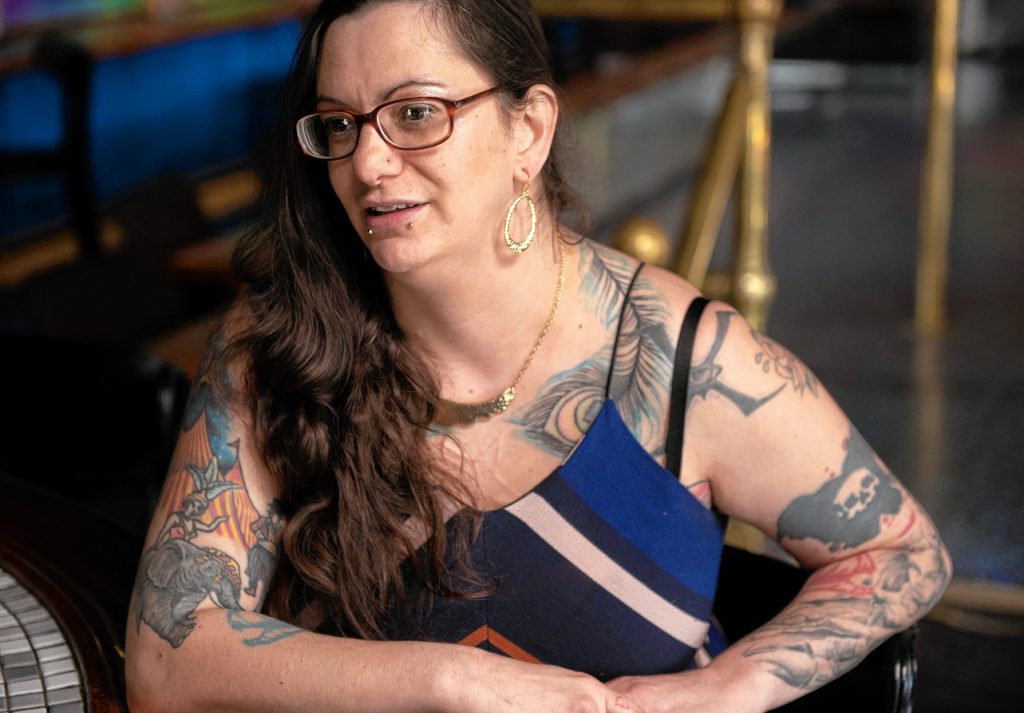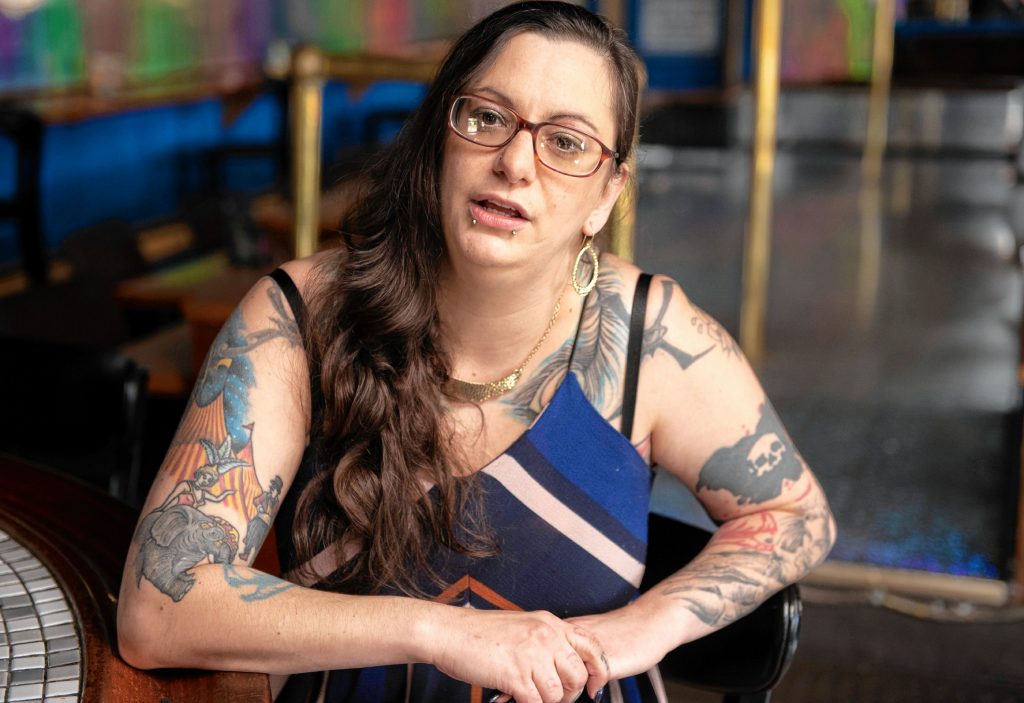It will soon be a new day for Club Castaway, which will reopen later this month as a rare strip club that showcases a diverse body of male, queer, and transgender entertainers, and with a manager who says she is committed to treating her workers well.
Out among the hayfields and pumpkin patches of Whately, a nondescript white building with blue trim on Route 5 houses Castaway, and it has been quiet for the past two months. In a few weeks, it will reopen under new ownership and be home to a cast of diverse dancers, pole dancing and burlesque classes, and the “Whately ballerinas.”
Bella Vendetta, who now manages the club and requested to use her professional name due to safety reasons related to sex work, spent eight years as a seasonal performer with Castaway and six months as manager under previous owner Demetrios “Jimmy” Konstantopoulos, who owned the club since the 1970s. She decided to return to Club Castaway after leaving this past May because she found the new owners, Nicholas Spagnola and Julius Sokol, both of Boston, to be a receptive audience for her vision of creating an inclusive space for a diverse body of male-identifying, queer, and transgender performers.
Many of the ideas that Vendetta wanted to implement during her time as manager fell on deaf ears under previous ownership, but now she sees a chance to create a unique club.
“They made me want to be a part of it because I was really clear that I didn’t want to come back and do this unless I could do it the way I thought was the right way,” said Vendetta of the new owners. “They have put their support and belief in me to let me try at the very least and that made me want to come back.”
Opening night, for instance, on October 29, will be a lesbian night. “That (opening with a lesbian act) would never have happened in any other club that I’ve worked at, and I’ve worked at clubs across the U.S., so that was a really big deal,” Vendetta said.
Vendetta’s vision includes dedicating certain days of the week to various groups of performers underrepresented in the strip club scene: Mondays for male-identified dancers for day and night shifts; Tuesdays for a rotating roster of special events highlighting queer and trans strippers, pole dancing showcases, burlesque classes and workshops; Wednesdays through Saturdays for traditional “Vegas show-style” club with their signature “Whately ballerinas” and new dancers; Sundays there will be no performances.
Vendetta has a prominent presence in the area as an activist and founder of the non-profit advocacy group Team Clear Heels 413, which provides support for dancers and sex workers with child care services and health resources among other advocacy work.

Posters for Team Clear Heels 413 to be used in the Noho Pride parade. Photo courtesy Bella Vendetta.
During the 2018 Northampton Pride parade, Team Clear Heels 413 marched and spoke out against SESTA (Stop Enabling Sex Traffickers Act), an anti-sex trafficking federal law passed last year that had harmful effects for consensual workers by taking away venues for them to advertise, according to Vendetta. Websites, such as Backpage and the Craiglist’s personals section — where consensual sex workers could screen clients, advertise without resorting to street work, and communicate with other sex workers about clients — were immediately taken down.
There is a lack of resources or institutions for sex workers in the state, Vendetta said, which is what inspired her to form the non-profit in late 2017. She continues to lobby politicians on repealing SESTA and asking elected officials to consider decriminalization of sex work through the non-profit. Other sex worker organizations in the state include the Sex Workers’ Outreach Project in Boston and Arise for Social Justice in Springfield, which has done advocacy for sex workers as part of their Women In Support of Each Other Committee by attempting to decriminalize prostitution in the city.
“We have the queer community here,” said Vendetta, who would frequently get inquiries about queer and trans performers during her previous managerial role at Castaway.
“I think we are going to get support not only from the queer community but from curious straight people, too, that want to see what it’s all about,” Vendetta said.
In May, the state approved the transfer of the liquor and adult entertainment licenses to Spagnola and Sokol and the town set certain conditions with the transfer of the licenses, including a capacity of 95 people, a new video surveillance system, and a police officer or two security guards on duty during certain hours of operation. The owners have backgrounds in real estate and neither have owned a strip club before, according to Spagnola.
Spagnola said he became aware of Club Castaway around 2014 when he and his business partner were exploring the possibility of purchasing a farm to cultivate marijuana in Whately, but decided to change ventures and opted to purchase the strip club instead.
“We looked at the amount of available new licenses in the state of Massachusetts and realized that there are probably 25 or less operators” of adult entertainment establishments, Spagnola said. “It’s a great license to have. The industry is right for a turnaround, and it’s the right time for the right operator to come in and operate this business correctly.”
‘Kind of a big deal’

Lorelei Erisis chants at the head of Team Clear Heels 413 at Noho Pride 2018. They wanted to bring attention to the SESTA/FOSTA law they say endangers consensual sex workers.
Lorelei Erisis, a transgender woman who is a member of Team Clear Heels 413, has known Vendetta for the past decade and said she sees a lot of potential for the reopening of Club Castaway. Erisis, also a columnist for The Rainbow Times, said a question she gets regularly from members in the community and her readership is: Where are the nightclubs for trans people?
“I’ve been looking into it recently and there really is nowhere closer than New York,” Erisis said. The reopening of Club Castaway, with nights dedicated to trans folk, “is kind of a big deal.”
Ever since Diva’s Nightclub in Northampton closed in the fall of 2016 there has been a lack of places specifically for queer and trans people to gather in a nightclub setting, according to Erisis. The Majestic Saloon on Main Street in Northampton has “picked up some of the slack” in recent months with a weekly queer night, she said. As of Sept. 1, Majestic is now a “fully popped queer bar,” according to an announcement from the bar’s management.
The X-Room at Mardi Gras in Springfield is one of the only strip clubs in the state with male-identifying dancers, and although there are queer bars in Boston, Vendetta and Erisis both said that adult-entertainment establishments that feature LGBTQ performers are not found in the state or surrounding area.
The community of Northampton, a short drive down 91 from Whately, is accepting and inclusive, Erisis said. “You can go anywhere now.” She has marched in the Northampton Pride Parade and said the event brings national attention to how welcoming the town is towards LGTBQ-identifying people, but having a strip club inclusive of queer and trans performers and customers nearby would provide a different opportunity.
“I haven’t been to a lot of strip clubs because I am a queer trans woman. It hasn’t always seemed like a good idea,” Erisis said. “It’s generally not the safest-feeling environment. I am opening myself up to all sorts of harassment, and some clubs are fine but a lot aren’t.”
She added that Vendetta is attempting to make Club Castaway into “a place that is really good to work and safe and fun and lucrative for dancers to work at.”
Although LGTBQ-inclusive strip clubs are uncommon in the region, a local sex worker activist with a decade of experience as a stripper, who declined to use her real name due to the nature of her work and for safety concerns, questioned how beneficial such an environment could actually be for queer and trans performers.
“It’s important to remember that people surviving on their sex work income do their jobs for money and not for vague feelings of empowerment or to have their identities confirmed,” she said. “Working class queer dancers end up enduring financial losses because of these nights at the very same time that they are pressured to out themselves to club patrons in order to fit in, and possibly in order to be allowed to work at all, sacrificing their privacy and any work-life divide they might want to maintain.”
She said bar ownership will make money on cover charges and drinks while dancers on shift on LGBTQ nights might not see economic benefits. In her experience, attendees of these events generally spend less money on lap dances than conventional strip club customers do.
“I worry about dancers both old and new who will need to choose between identifying as queer in their client-facing branding or losing shifts,” she said.
Providing resources
When Vendetta started working as a strip dancer 14 years ago, there were few resources to learn how to become a successful one, she said.
“You found out who the hustler in your club was, you hopefully befriended them, and you learned their secrets,” she said. “But, mostly it was trial and error and you figured it out. And it’s a pretty steep learning curb, so it’s different now.”
Nowadays, Vendetta said that aspiring club dancers can learn tips from YouTube or websites dedicated to sharing expertise on how to hustle a room, whether that’s working customers for tips or interacting with the audience.
Pole dancing is crossing over into the mainstream and, as of 2017, is considered a sport by the Global Association of International Sports Federations.
Vendetta said she sees a negative aspect to this as well, however.
“Pole is in and there are studios and they all want you to know that ‘this is not a stripper class,’” Vendetta said. “And that’s bullshit because they are taking our culture away and reselling it and repackaging in a commodified way, and it’s pretty disgusting.”
At Castaway, there will be burlesque (vaudeville striptease acts) and pole dancing lessons for experienced strip dancers and “civilians” — people who aren’t professional strippers, Vendetta said. That’s a long way from how Vendetta started out in the business and how other establishments operate.
“Usually when you start dancing they just throw you in and they are like, ‘OK, start. Find Jessica over there, she’s been here for a while, go ask her,’” Vendetta said. “There’s no training. I don’t do that to my dancers at all because I’ve been there and that’s scary.”
In terms of burlesque classes available locally, Randy Barrios, who is known as drag performer Hors D’oeuvres and is an organizer with Noho Pride, mentors new performers in the Northampton area with Bon Appetit Burlesque.
“The Club Castaway model is unique for this part of the state,” Barrios said. “The only comparable burlesque classes I can think of are through entities in Boston.”
Not only is Club Castaway attempting to distinguish itself with its diversity of dancers, but they are implementing labor practices such as putting dancers on payroll to make clear that dancers are just like any other employee at any other business or company.
It is common for other strip clubs to charge dancers for the chance to perform, Vendetta said, a practice known as a “house fee,” which Club Castaway is rejecting, and one that has been challenged in court.
A side hustle or a career?
As part of the recruitment process for the reopening of the club, Vendetta asks candidates a range of questions from how much money they need to make to have a “good night” to what they do to further their career as dancers.
Some dancers make $200 a night and they are happy. Others say that anything below $1,200 in one night is considered a failure, Vendetta said.
She asks candidates why they dance: “Are you just making dollars before college? Are you making a career out of it? Is it a side hustle? These are things to know.”
A lot of dancers who get into the business young can all of a sudden have a lot of money that they don’t have experience in handling, and money-savvy dancers at Club Castaway help new dancers learn about money management and financial responsibility, according to Vendetta.
“They haven’t been told how to manage money and people do stupid things like buy cars, and fur coats, and apartments they won’t be able to afford in a year,” she said.
There is a notion that many strip club dancers have taken the job to pay their way through college or higher education, a notion that Vendetta said is only slightly true in the local area.
Most people are dancing because it is their profession and they consider it their craft to such an extent that Vendetta has high expectations for her dancers.
“If you like your job, what are you doing to further your career in it?” is a question that Vendetta often asks dancers inquiring about the club.
That’s because many dancers are not only choosing to be strippers, “but they are going really far out of their way to study it and be good at it and have it be their career.”
A First Amendment issue
In the past two years, the fate of Club Castaways had become a contentious affair. Over the course of multiple public hearings with the Whately Select Board last year, town officials voiced discomfort at having the strip club operating in town and claims of illegal activity were leveled at the club — allegations that police said were unfounded at Select Board meetings.
Some Select Board members held out against the transfer, with Chairman Jonathan Edwards stating he did not like the idea that his young daughter and her friends might know about what goes on at Castaway.
The owners’ lawyer threatened to sue the town if it failed to approve the transfer of liquor and entertainment licenses, calling it a First Amendment issue. Eventually, the licenses were approved earlier this year — without litigation but with certain conditions imposed by the town.
“Unfortunately we have a Constitution and this is freedom of speech,” Edwards said at a meeting in June 2018. “But it’s awful.”
During a four-month probationary period for the club, per the conditions of transfer of licenses, there will be a detail officer during certain hours of operation Thursday through Saturday, from 9:30 p.m. to 1:30 a.m. If a detail officer isn’t available, there will be at least two security personnel on duty.
Another reason Vendetta returned to manage the club is because she wanted to create an environment she felt was safe. This time around, there will be surveillance cameras installed with the ability to view and record all areas of the parking lot, entrance and exit points, as well as outside break areas and all inside areas accessible to the public.
On top of that, Vendetta said, “We have highly trained security staff that actually care about these things and aren’t just guys we picked off the street that think it will be cool to work in a strip club.”
The owners are planning to renovate the club in January with new bathrooms, new VIP areas, a new bar, exterior work, and a new roof and siding for the building. The club also agreed to build an eight-foot wall near the smoking areas to alleviate some residents’ concerns over noise from the club.
“It makes sense to just roll this out slowly over the next few months,” Spagnola said. “It will ultimately be a good place for entertainers to come work and for people to just come and have a good time.”
Dancers will also have a protocol to follow if there are instances of customers “getting out of line,” Vendetta said. There was no protocol before, she said.
“It will make a big difference in dancers feeling safe and wanting to come to work,” she said.
Luis Fieldman can be reached at lfieldman@valleyadvocate.com.









